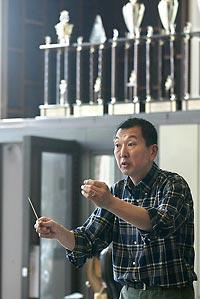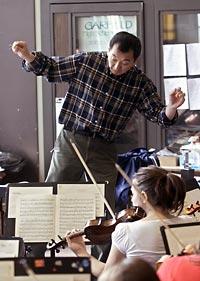Speak softly (and carry a small stick)

Marcus Tsutakawa has many musical gifts, but there's one thing he never learned how to do: toot his own horn.
That's why the Friends of Garfield Orchestra (FOGO) have organized a tribute tonight, honoring the modest man's two decades as conductor of the high-school orchestra he has built into the best in the country. That accolade was recently bestowed by Down Beat magazine, which named the Garfield Orchestra as the nation's top-ranking regular (non-performing-arts) high-school concert group. All it takes is a few words from Garfield alums to make you realize why Tsutakawa, the soft-spoken Zen father of the orchestra, has earned this tribute. Joe Kye, the orchestra's concertmaster last year and now a Yale University student, calls him "really one of the greatest teachers I know, who can teach music but also can completely relate to the kids. He treats you in a way that makes you not a kid anymore; he respects you. Being in his orchestra is a life-changing experience.
"He is not a teacher I once had; he is a mentor I will always have."
The "Bravo" event tonight is a reflection of the community's high regard for "Tsut," as Tsutakawa is affectionately known. The event is a production of the Friends of Garfield Orchestra parent support group that has long been a model of its kind in arts-education circles. Tsutakawa will get a mild roasting, a "dessert dash" fundraiser will help raise money for the orchestra program, and of course there will be music. Garfield alums get to join in alongside the current orchestra players.
A small start ...
"It's actually my 21st year, but who's counting?" says Tsutakawa. Typical of him, his pleasure in the success of Garfield's orchestra program is also accompanied by a wish that it were the same for schools all over the city.
"I wish every school had a great program with supportive parents. To play in an ensemble is fun — to get on stage and play a concert, getting out and having a good time. Kids of all ability levels and all backgrounds can get involved.
"I love seeing the younger or weaker players hang in there and get better. It's more rewarding to see their progress even than getting a great performance from my top group."
"I'm blessed to have talented kids and involved parents, who have helped at every step along the way," he says. "I couldn't do it without them."
He has made it a habit throughout his career to dwell on the positive, right from his earliest days at Garfield. Max Dimoff, now the principal bass of the esteemed Cleveland Orchestra, was a senior that first year, after the school had gone through four orchestra directors in as many years.
"There were only about three people in the orchestra when he came. He turned things completely around, mostly because of his personality. Kids related to him," recalls Dimoff. "Everything was based on respect; it's his way to engage the students. He never raised his voice, even when he had reason to. He won over a lot of kids who thought the orchestra was not cool. Now I keep track of him on the Internet, and the orchestra is bigger than I could have ever imagined."
Critical mass
While Tsutakawa thinks there were a few more than three students in that first class, he admits it was a skeleton crew of only a few string players until the word got out that good things were happening in the orchestra room.
"Then one flute asked to join the orchestra, as she wanted to play classical music and saw the orchestra doing something fun and worthwhile," he remembers. "Soon a couple more wind students joined. That eventually led to a full orchestra, and later a symphony orchestra with full brass and percussion as well as a harp or two."
Tsutakawa credits Garfield's band and jazz-band director Clarence Acox for his cooperation: "Unlike at other schools where the band director claims 'rights' to any woodwind, brass or percussion players, Clarence was OK with these players joining the orchestra. This was and still is a tremendous advantage and boost to our program."
There's never enough time in a high-school orchestra rehearsal, and Tsutakawa doesn't miss a moment of it. His former student Ruth Marshall, who graduated in 2002, remembers his "tremendous energy: He hops right up on the podium really quick, and gets straight to work. I remember when the Nisqually earthquake hit during rehearsal. We were all terrified that the school would collapse. When the earthquake was over, he stepped right back on the podium, and said, "OK, letter P, please."
Family of artists
Tsutakawa grew up as a member of one of Seattle's most important arts families: His late father, George, was an internationally renowned sculptor, and siblings Mayumi, Deems and Gerald have also made their mark in music, art, journalism and arts administration. With bachelor's and master's degrees in music from the University of Washington, he went on to earn several awards, including the Prix de Martell "Champions of Classical Music" award, recognition as a KSTW Class Act Teacher and the presidency of Metro Music Educators (1989-1998). He conducts the Junior Symphony, a training orchestra for the Seattle Youth Symphony Orchestra, and he is a member of the Seattle Symphony board of trustees.
Looking over his years with Garfield, Tsutakawa says the kids' self-esteem has risen because their peers give them respect for their success. They work hard to move up in their sections, and even harder to get into the top group of the three he conducts (which also include freshman and intermediate orchestras).
Next year there will be even more orchestra students, totaling 170, but Tsutakawa still isn't satisfied. There aren't enough French horns, for instance — possibly because popular middle-school jazz programs produce a lot of trumpet and sax players, but you can't play jazz on the French horn.
But the savvy Tsutakawa has recently taken his top orchestra group to the middle schools, performing film-score hits like "Pirates of the Caribbean" in an assembly to show younger kids that orchestral music can be exciting as well.
Quiet authority
"If kids are talking in class, I tell them they can go out in the hall and talk all they want," he says. "But they don't. They care about each other and they want to pay attention. If they can be quiet, I can work, and they know this."
Another team-building effort has been the international tours, which take place every two or three years: Europe in 1997, Japan in 2000, 2003 and 2005. The orchestra will go to Boston next spring to play in the legendary Symphony Hall — and scope out colleges like Harvard, New England Conservatory and Berklee School of Music. And in 2008, Tsutakawa is planning another international tour: "Maybe China this time."
The tours build more than musical excellence. Students say that being in a foreign country together not only puts them on their mettle, but also shows clearly how they can relate to other kids with music.
"Before a tour, he tells the orchestra to come up with their own code of conduct, and he leaves the room," says Kye. "If the code is broken, there is no one to look to but ourselves. He fosters leaders because he offers leadership to us. He trusts us with maturity, so we become mature."
Especially on Father's Day, it can make you a little sniffly to read the comments and e-mails about this "orchestra dad" from Tsutakawa's former students, like this one from Darko Butorac (now director of orchestras at Northern Arizona University):
"Marcus Tsutakawa has literally changed my life. He made an incredible orchestra program out of nothing — the repertoire we played in class was what professional orchestras play; it was the best exposure a young student can have to classical music. Using classical music, we not only learned how to become better musicians, but ultimately better citizens — through music he taught us how to work with other people, to really see how a whole is greater than the sum of its parts, in general how music imitates life.
"As late as May of my senior year I was set on becoming an engineer. I even secured a spot at Northwestern University. And it was through Tsutakawa's support that I first had a chance to conduct an orchestra (first movement of Tchaikovsky's "Fifth Symphony" — what an amazing first piece to conduct), that my eyes were opened to this field. And that support made it all happen.
"Music can change the world. It can also describe the inexpressible, much like the education we received as members of the Garfield High School Orchestra."

Coming up
Bravo! A Salute to Marcus Tsutakawa7 tonight, St. Demetrios Hall, 2100 Boyer Ave. E., Seattle $25, $10 for students (www.garfieldorchestra.org).